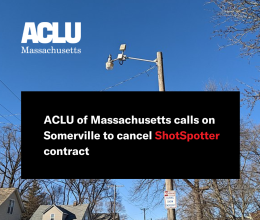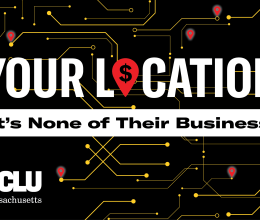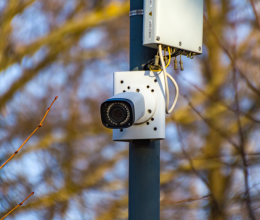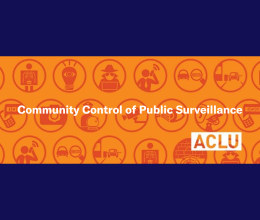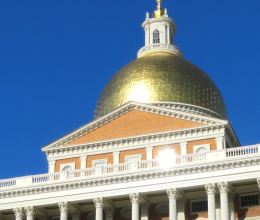
Boston City Councilors Michelle Wu and Ricardo Arroyo today introduced an ordinance banning city government use of face surveillance technology. A key goal of the ACLU’s “Press Pause on Face Surveillance” campaign, the ordinance is supported by a diverse coalition of privacy, racial justice, and civil rights groups.
The councilors also filed a companion ordinance to bring transparency, accountability, and oversight to the City’s use of surveillance technology more broadly, and to protect student privacy.
“It takes a foundation of trust to strengthen communities, especially during these uncertain times,” said At-Large Boston City Councilor Michelle Wu. “Boston should be a leader in setting policies for transparency, accountability, and community oversight.”
The need to prohibit face surveillance in Boston is particularly time-sensitive: Public records obtained by the ACLU reveal that a mere software update at the Boston Police Department could super-charge Boston’s existing network of surveillance cameras, establishing a face surveillance system capable of monitoring every person’s public movements, habits, and associations. The City of Boston has been using BriefCam software since at least 2017 via a contract with Lan-Tel Communications. Boston currently uses a version of BriefCam that does not have face surveillance features. The City’s current contract is set to expire on May 14, 2020; if the City renews its BriefCam contract and upgrades to the latest software version, city officials will have instant access to a dangerous and unregulated surveillance tool.
"Studies continue to provide evidence that facial recognition technology disproportionately harms Black and Brown communities which further widens the racial inequities we already face," said District 5 Boston City Councilor Ricardo Arroyo. "Especially now, during a time where communities of color are being hit hardest by COVID-19, we need to proactively ensure that we do not invest in technology that studies show are ineffective and further racial inequity.”
The ordinances will also help ensure that any use of surveillance technologies to protect public health amid the COVID-19 pandemic is proportionate, effective, and responsible. While other countries have turned to surveillance technologies to track people subjected to COVID-19 quarantine orders, the City of Boston has not publicly deployed digital technologies to augment analog contract tracing efforts or to enforce physical distancing orders. If the City does turn towards those digital methods, it’s essential that they be subjected to rigorous transparency, accountability, and oversight to protect the public interest.
“Strong privacy protections and surveillance oversight are vital to engendering public trust, which is essential to an effective fight against this pandemic,” said Kade Crockford, director of the Technology for Liberty at the ACLU of Massachusetts. “But we also need to make sure that, when we’ve made it past this crisis, our communities are not transformed into places we don’t want to live in. Face surveillance poses unprecedented threats to our civil rights and civil liberties. Subjecting residents and visitors to 24/7 surveillance impacts the privacy rights of everyone, but it is especially dangerous for Boston’s Black and Brown communities, which are already disproportionately targeted. The Boston City Council must act quickly to pass a municipal ban on the local government’s use of surveillance technology, to keep everyone safe and free. Boston has a chance to lead here, and we look forward to working with allied organizations, the Council, and the City to ensure we do.”
“For years, our organization, led by directly impacted youth, has seen firsthand how young people and their families are discriminated against and criminalized,” said Valeria Do Vale, lead organizer with the Student Immigrant Movement, which has been working with the ACLU and city councilors on the ordinances. “We are excited to work with the City Council to ensure school is a safe place for all young people and their families, no matter their race or immigration status.”
“Information sharing practices between law enforcement agencies have been a major aspect of anti-Muslim surveillance, that strengthens the school-to-prison and school-to-deportation pipelines,” said Jarib Rahman, community organizer with Muslim Justice League. “These ordinances will begin to prevent the many ways in which routine school issues, unnecessarily and dangerously, become matters concerning law enforcement. It is a major step in keeping our communities safe and healthy.”
The ACLU of Massachusetts launched the “Press Pause on Face Surveillance” campaign in June 2019 to build awareness about the civil liberties concerns posed by face surveillance and the need to pass a statewide moratorium on the government’s use of the technology. In the first eight months of the ACLU campaign, five other Massachusetts municipalities—Springfield, Cambridge, Northampton, Brookline, and Somerville—have brought this technology under democratic control by introducing and enacting local prohibitions on government use. These ordinances strengthen the civil liberties of more than 430,000 Massachusetts residents, and protect them from dystopian, unregulated, often racially biased technologies.
A poll shows nearly 8 in 10 Massachusetts voters support a moratorium on government use of face surveillance technology, which is currently unregulated in the state. An ACLU-backed bill before legislators on Beacon Hill would establish a statewide moratorium on government use of face surveillance and other biometric screening technologies until the legislature imposes checks and balances to protect the public’s interest.
